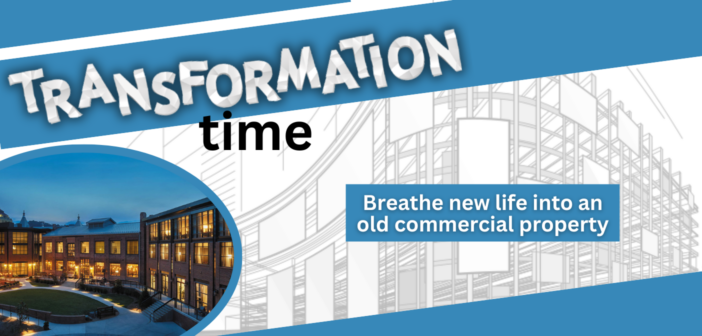Breathe new life into an old commercial property
One of the hottest trends in the hotel industry is repurposing buildings for hotel use. Transforming existing buildings makes economic sense and can enhance the guest experience. Many building types are appropriate candidates for conversions to hotels, but the most opportunities are discovered in office buildings. According to CBRE, there currently is more than a 17% vacancy rate in office buildings, the highest vacancy rate since 1993. Developers are looking for different uses to breathe new life into these structures. If positioned in appropriate locations, hoteliers can creatively adapt these structures into hotels, including limited-service, full-service, and boutique hotels.
EVERYONE WINS
Repurposing existing commercial buildings has advantages, including minimizing construction costs, reducing construction schedules, and minimizing environmental impacts. The existing structures often have a history that can be celebrated as part of the guest experience. In Asheville, NC, David Tart, a partner with Raines Development, transformed a steel foundry that had forged steel for the construction of Biltmore Estates into an 87-key boutique hotel, which can be seen in the accompanying image. Brick interior walls and arched windows create a unique guest experience that illustrate the history and authenticity of the steel foundry. Plus, historic buildings often qualify for national and state historic tax credits, adding to the bottom line of the developer’s proforma.
LOGICAL CONVERSIONS
In the coming years, there will be an abundance of office buildings available as pre-pandemic leases expire. If the buildings have appropriate column bay spacings, and building depths, most office buildings can be efficiently converted for hotel use. ODA Architecture currently is transforming office buildings in Greenville, SC, and at the BWI airport to hotels. Repurposing can save months of approval times and construction schedules. Office buildings require more parking than hotels, leaving large parking lots available for the development of additional hotels, restaurants, residential, or other complementary amenities.
Urban retail buildings/department stores, mills, jails, schools, hospitals, and churches all can be creatively adapted to hotels. These buildings tell local stories that provide for more memorable stays, as well as pay tribute to the history and character of its setting. Saving sentimental buildings and transforming them for hotel uses often garners favor and advocacy with local historical and planning boards.
Adaptive use of existing buildings to hotels is also beneficial to the environment. According to Gensler, new construction annually contributes 11% to global carbon emissions. Converting existing buildings cuts that percentage by 90%. Demolition of existing buildings creates large amounts of debris for landfills. Repurposing buildings generates 10% of the construction debris created by demolition of existing buildings.
CHALLENGE ACCEPTED
Converting buildings to an alternative use can have many challenges. Every empty building isn’t necessarily a candidate for a hotel. Developers and architects should provide extensive due diligence before committing to a conversion. Market studies need to be performed to ensure the feasibility of the project.
The building needs to be analyzed for an efficient layout of the typical floors, dependent on the location of the building core and the column spacings. Analyzing the building’s structural system determines whether any major modifications will be necessary. Hazardous materials often are present and must be abated before repurposing can begin.
Meeting national energy codes can add construction costs. Many older buildings don’t meet modern fire safety standards or the Americans with Disabilities Act requirements. Remediation of these deficiencies to conform to current codes adds construction costs.
The next generation of travelers and hotel guests are seeking unique and rewarding experiences. Staying in a hotel that has modern-day conveniences while boasting a rich history with many stories to tell will enrich the guest’s experience. These experiences differentiate adaptive use hotels in an increasingly competitive environment for hotel guests. Vision, creativity, and experience are essential to successful adaptive use hotel projects. When completed, these unique, repurposed hotels are very rewarding for the hotelier, the local community, and the environment.





